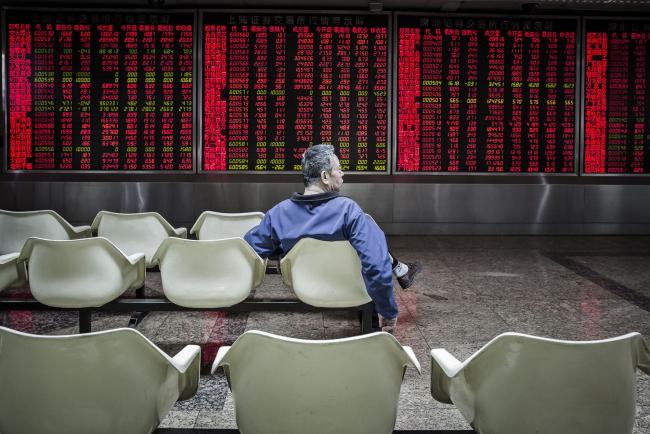(Bloomberg) -- Mainland Chinese stocks are outperforming their offshore-listed peers as domestic investors bet the country’s economy will withstand the trade war with the U.S.
The Shanghai Composite Index has rallied more than 20% this year, compared with a 3% advance by the Hang Seng China Enterprises Index in Hong Kong. The Shanghai measure is trading near its highest level relative to the H-share gauge since late 2017.
The bullish sentiment onshore comes amid expectations of state support ahead of the 70th anniversary of the People’s Republic of China on Oct. 1 -- even as foreign traders grow pessimistic in the face of a slowing global economy and a sliding yuan. After markets closed on Friday, the central bank lowered the amount of cash banks must hold as reserves to the lowest level since 2007.
"The divergence shows that domestic investors have more faith in China’s ability to guide its economy through the trade war," said Gu Yongtao, a Beijing-based strategist with Cinda Securities Co.
The Hong Kong market is more sensitive to flows of foreign funds, which will pull out of emerging markets amid global uncertainty, Gu said. Such sensitivities haven’t deterred bullish onshore investors from snapping up shares in Hong Kong’s stock market for 36 straight days as of Friday, the longest stretch since late 2017.
The latest easing may help sustain gains. The required reserve ratio for all banks will be lowered by 0.5 percentage points, taking effect on Sept. 16, the People’s Bank of China said Friday. The PBOC also cut the reserve ratios by one additional percentage point for some city commercial banks, to take effect in two steps on Oct. 15 and Nov. 15.
China Cuts Banks’ Reserve Ratio to Ramp Up Easing Support
The Shanghai Composite added 0.4% as of 10 a.m. local time while the Hang Seng China gauge was little changed.
"China has a strong central government, which has more policy room and influence over its markets and the economy than its peers, so local investors can count on that," said Dai Ming, a fund manager with Hengsheng Asset Management Co. Expectations that authorities will act to keep the mainland stock market stable before China’s national day celebrations will also boost onshore equities, he said.
The divergence between mainland stocks and their Hong Kong-listed peers will continue as long as the trade war drags on, according to Ronald Wan, chief executive of Partners Capital International Ltd. Offshore shares are also being hurt by weak sentiment in Hong Kong, he said. The city has been rocked by weeks of anti-Beijing protests that show no signs of abating and threaten to spur capital outflows.
Depreciating Yuan
The onshore gains defy a depreciating yuan that has weakened 3.5% this year. It fell past the key 7 per dollar level amid an escalation in the trade war.
The dropping yuan affects offshore equities more as Hong Kong-listed Chinese firms generate their earnings in yuan, so the weaker currency makes their valuations more expensive, according to Fu Gang, a fund manager with Shanghai RiverEast Asset Management Advisory Ltd.
China Stocks Turn Hot, Lure Most Foreign Inflows Since November
It’s not all gloom for H shares.
While the disconnect with mainland equities may remain in the near term, Fu expects the gap to narrow as valuations in Hong Kong have dropped to historical lows. China’s A shares are now nearly 30% more expensive than their Hong Kong-listed peers.
"H shares look very attractive from a valuation perspective," Fu said. "As long as we have enough flows from the mainland, the valuation gap will shrink and H shares will likely flip."
